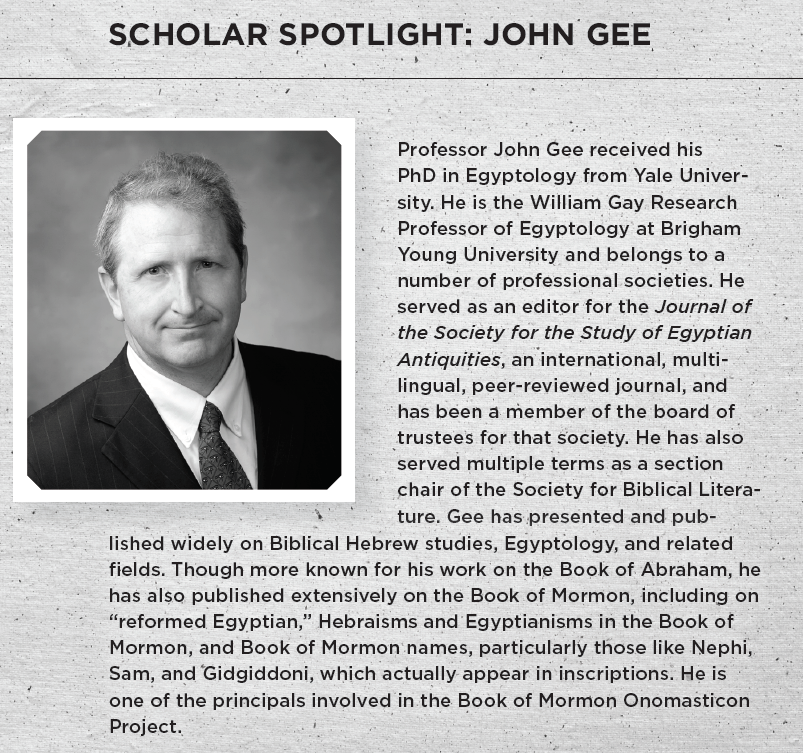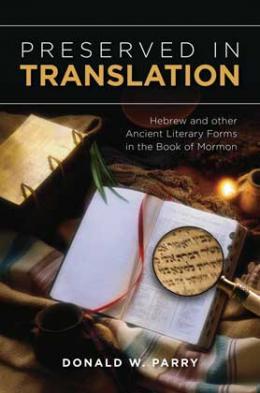Possessive Pronouns
Donald W. Perry, “Possessive Pronouns,” in Preserved in Translation: Hebrew and Other Ancient Literary Forms in the Book of Mormon (Provo, UT: Religious Studies Center, Brigham Young University; Salt Lake City: Deseret Book), 61‒66.
"your envyings, and your strifes" (3 Nephi 30:2)
In English, when a list of nouns is preceded by a personal possessive pronoun (such as her, his, my, our, thy (your), their), general practice is to use the pronoun only once. For example, we might say, in paraphrasing from Exodus 20:10, “Thou shalt not do any work, thou, nor thy son, daughter, manservant, maidservant, cattle, nor stranger.” Biblical Hebrew, however, regularly repeats those pronouns in such a list.[1] Here is that same passage from the King James Version, which accurately represents the original Hebrew: “Thou shalt not do any work, thou, nor thy son, nor thy daughter, thy manservant, nor thy maidservant, nor thy cattle, nor thy stranger.”
There are scores of instances of this Hebrew usage in the Old Testament. Consider these additional examples:
“after their families, after their tongues, in their countries, and in their nations” (Genesis 10:20; see also verse 31)
“my charge, my commandments, my statutes, and my laws” (Genesis 26:5)
“thy weapons, thy quiver and thy bow” (Genesis 27:3)
“his wives, and his sons, and his daughters, and all the persons of his house, and his cattle, and all his beasts, and all his substance” (Genesis 36:6)
“and thy children, and thy children’s children, and thy flocks, and thy herds” (Genesis 45:10)
“upon their streams, upon their rivers, and upon their ponds, and upon all their pools of water” (Exodus 7:19)
“We will go with our young and with our old, with our sons and with our daughters, with our flocks and with our herds” (Exodus 10:9)
“upon all his host, upon his chariots, and upon his horsemen” (Exodus 14:17)
“nor his manservant, nor his maidservant, nor his ox, nor his ass” (Exodus 20:17)
“his shaft, and his branches, his bowls, his knops, and his flowers” (Exodus 25:31)
“his ashes, and his shovels, and his basins, and his fleshhooks, and his firepans” (Exodus 27:3)
“one shall burn the heifer in his sight; her skin, and her flesh, and her blood, with her dung” (Numbers 19:5)
“ye will save alive my father, and my mother, and my brethren, and my sisters” (Joshua 2:13)
“The Lord is my rock, and my fortress, and my deliverer; . . . my shield, . . . my high tower, and my refuge, my saviour” (2 Samuel 22:2–3)
“on our kings, on our princes, and on our priests, and on our prophets, and on our fathers” (Nehemiah 9:32)

Inasmuch as Lehi and his family came from a Hebrew linguistic tradition, we would expect to find this same pattern in the Book of Mormon. And it is indeed found in many places. An exceptional case is found in 3 Nephi 30:2, where your is repeated twelve times:
Turn, all ye Gentiles, from your wicked ways; and repent of your evil doings, of your lyings and deceivings, and of your whoredoms, and of your secret abominations, and your idolatries, and of your murders, and your priestcrafts, and your envyings, and your strifes, and from all your wickedness and abominations, and come unto me, and be baptized in my name, that ye may receive a remission of your sins, and be filled with the Holy Ghost.
Helaman 3:14 gives us another impressive example, where their is used twelve times:
But behold, a hundredth part of the proceedings of this people, yea, the account of the Lamanites and of the Nephites, and their wars, and contentions, and dissensions, and their preaching, and their prophecies, and their shipping and their building of ships, and their building of temples, and of synagogues and their sanctuaries, and their righteousness, and their wickedness, and their murders, and their robbings, and their plundering, and all manner of abominations and whoredoms, cannot be contained in this work.
The Book of Mormon contains many other instances of the repeated possessive pronoun. Here is a sampling:
“My friends and my brethren, my kindred and my people” (Mosiah 4:4)
“the goodness of God, and his matchless power, and his wisdom, and his patience, and his long-suffering” (Mosiah 4:6)
“and your thoughts, and your words, and your deeds” (Mosiah 4:30)
“fifth part of their gold and of their silver, and a fifth part of their ziff, and of their copper, and of their brass and their iron; and a fifth part of their fatlings; and also a fifth part of all their grain” (Mosiah 11:3)
“if it had not been for his matchless power, and his mercy, and his long-suffering towards us” (Alma 9:11)
“and took their swords, and their spears, and their bows, and their arrows, and their slings” (Alma 17:7)
“for this is my life and my light, my joy and my salvation, and my redemption from everlasting wo” (Alma 26:36)
“by their traditions and their dreams and their whims and their visions and their pretended mysteries” (Alma 30:28)
“their costly apparel, and their ringlets, and their bracelets, and their ornaments of gold, and all their precious things” (Alma 31:28)
“their oaths, and their covenants, and their agreements in their secret abominations; yea, and all their signs and their wonders” (Alma 37:27)
“thy faithfulness and thy diligence, and thy patience and thy long-suffering” (Alma 38:3)
“by our faith, by our religion, and by our rites of worship, and by our church” (Alma 44:5)
“his sword and his cimeter, and his bow” (Alma 44:8)
“their houses, yea, their cities, and their temples, and their synagogues, and their sanctuaries, and all manner of their buildings” (Helaman 3:9)
“to keep his commandments and his statutes and his judgments” (Helaman 15:5)
“with his family, his flocks and his herds, his horses and his cattle” (3 Nephi 6:1)
This topic is important enough that additional research is required so that we can fully comprehend the use of repeated possessive pronouns in both ancient Hebrew and in the Book of Mormon. And a final note: John Tvedtnes has correctly observed that repetition of the personal possessive pronouns in English would be considered by some to be a waste of space, especially on precious writing materials such as metals or leather parchment.[2] But the possessive pronouns in Hebrew are affixed to the nouns they modify, thus taking up much less space than pronouns in English. Note how the English translation of Genesis 10:20 (King James Version) takes up much more space than the Hebrew rendering (both are in 12 point font):
These are the sons of Ham, after their families, after their tongues, in their countries, and in their nations.
אלה בני חם למשפחתם ללשנתם בארצם בגויהם
Notes
Notes
[1] For discussions of this grammatical convention, see Gesenius, Hebrew Grammar, 439; and Ewald, Syntax of the Hebrew Language, 234. See also Tvedtnes, “Hebraisms in the Book of Mormon: A Preliminary Survey,” 53–55; and Parry, “Hebraisms and Other Ancient Peculiarities,” 179–80.
[2] Tvedtnes, “Hebraisms in the Book of Mormon: A Preliminary Survey,” 53.
